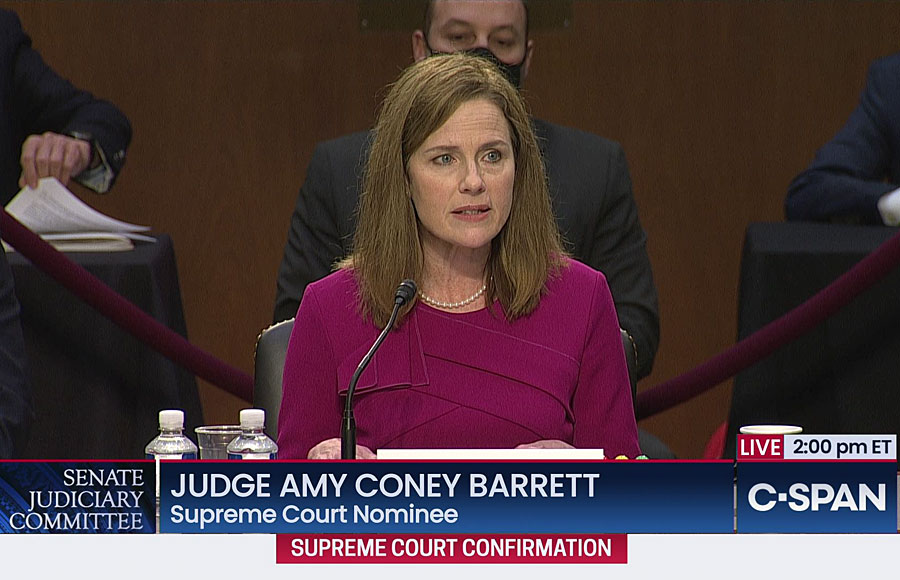
WASHINGTON, D.C. – Democrats on the Senate Judiciary Committee know that, barring something unexpected, they lack the votes to block President Donald Trump from installing his third justice in four years on the Supreme Court and creating a 6-3 conservative majority.
They also know that, in a normal year, by mid-October Congress would be out of session and members home campaigning. But 2020 is obviously no normal year. So, while the rest of Congress is home, Democratic Judiciary members are trying something very different in the hearings for nominee Amy Coney Barrett. Rather than prosecuting their case against Barrett, currently a federal appeals court judge, they are refighting the war that helped them pick up seats in 2018 — banging on Republicans for trying to eliminate the Affordable Care Act.
Conveniently, the ACA is relevant to the Supreme Court debate because the justices are scheduled to hear a case that could invalidate the law on Nov. 10 — exactly a week after Election Day.
As California Sen. Kamala Harris, a member of the Judiciary Committee and the Democratic vice presidential candidate, put it to Barrett on Tuesday, “Republicans are scrambling to confirm this nominee as fast as possible because they need one more Trump judge on the bench before Nov. 10th to win and strike down the entire Affordable Care Act. This is not hyperbole. This is not hypothetical. This is happening.”
Said Sen. Richard Durbin (D-Ill.), also on Tuesday: “We really believe the Supreme Court’s consideration of that case is going — could literally change America for millions of people.”
To be sure, Republicans too were playing to their electorate during the questioning of Barrett, as they expounded on her conservative credentials on issues such as gun rights.
Nonetheless, Democrats were uniformly disciplined in their assault on her potential vote in the ACA case. They chided both Barrett and the Republicans who are rushing her nomination to the floor literally days before a presidential election. In addition, Democrats criticized Republicans for spending time on a nonemergency nomination while continuing to ignore the need for financial and other relief for the COVID-19 pandemic.
And they raised what in more normal times would be the featured talking point for Democrats: the threat to abortion and other reproductive rights from Barrett, who before her elevation to the federal bench publicly opposed abortion and taught law at Notre Dame, one of the nation’s preeminent Catholic universities.
“For many people, and particularly for women, this is a fundamental question,” said Sen. Dianne Feinstein (D-Calif.), the committee’s top Democrat.
Barrett, like every other Supreme Court nominee for the past three decades, declined to offer positions that could suggest which way she might rule on hot-button issues, including abortion and the ACA.
She repeatedly cited what has come to be called the “Ginsburg rule” — after the justice she would replace, Ruth Bader Ginsburg — saying “no hints, no previews, no forecasts.”
Still, Democrats suggested that she may have tipped her hand on the Affordable Care Act case. In pointing out that the issues in the case, now known as California v. Texas, are different from the previous cases upholding the health law in 2012 and 2015, she said the current case will turn on “severability.”
She was referring to the question of whether, if one portion of a law is found to be unconstitutional, the rest of the law can stand without it. In the current ACA case, a group of Republican attorneys general — and the Trump administration — are arguing that when Congress reduced the ACA’s penalty for not having insurance to zero, the requirement to be covered no longer had a tax attached, and therefore the law is now unconstitutional. They based their argument on Chief Justice John Roberts’ 2012 conclusion that the ACA was valid because that penalty was a constitutionally appropriate tax.
The law’s opponents say the rest of the law cannot be “severed” and must therefore fall, too. A federal district judge in Texas agreed with them.
But merely saying the case turns on severability suggests that Barrett has already prejudged major parts of the case, Democrats said. Sen. Chris Coons (D-Del.) noted, “You don’t get to the question of severability if you haven’t already determined the question of constitutionality. (https://locals.md) ”
Barrett insisted repeatedly that despite an article she wrote in 2017 suggesting that the 2012 case upholding the law was wrongly decided, “I have no animus to nor agenda for the ACA,” as she told Sen. Amy Klobuchar (D-Minn.) on Wednesday.
In their rare show of unity of message, Democrats made clear that their primary audience in these hearings was not their Senate colleagues, but the voting public. While this battle looks lost, they hope to win the War of Nov. 3.
This story also appeared in KHN’s HealthBent, a regular feature of KHN (Kaiser Health News), offering insight and analysis of policies and politics from KHN’s chief Washington correspondent, Julie Rovner, who has covered health care for over 30 years. KHN is an editorially independent program of KFF (Kaiser Family Foundation), which is not affiliated with Kaiser Permanente.



Comments are closed.